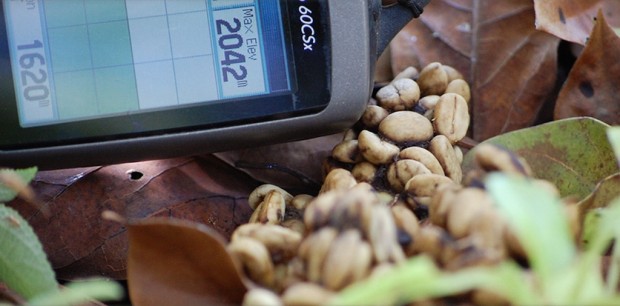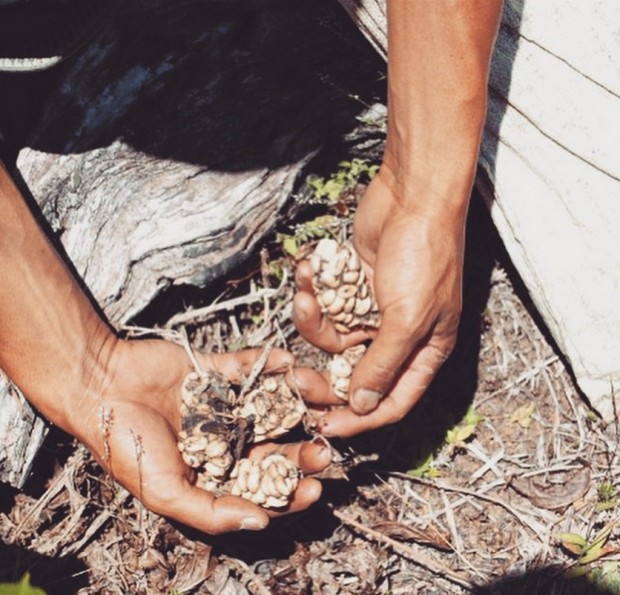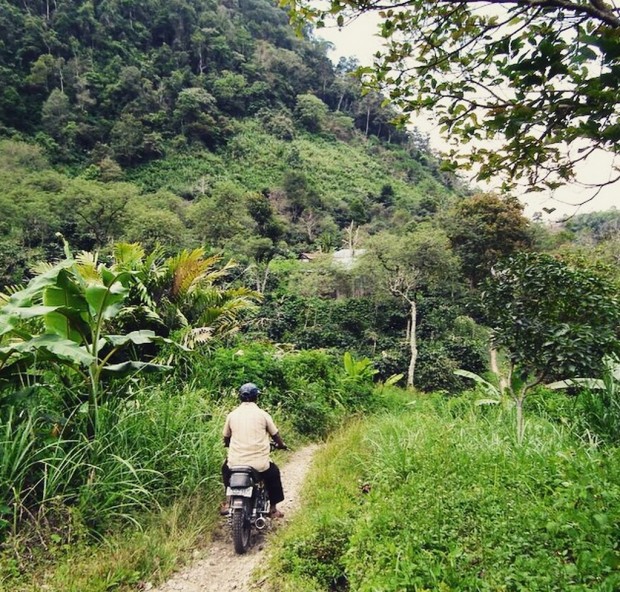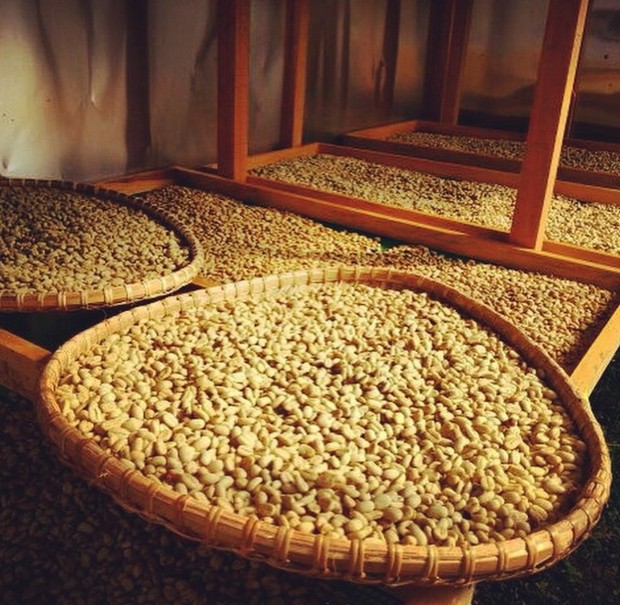In the Gayo highlands in the Northern Sumatran sub-region of Aceh, certain smallholder farmers whose lands abut jungles know that a busy morning follows a cooler, rainier night. That is when conditions are ideal for palm civets to emerge from their hiding places, feed on whole ripe coffee cherries, and then leave droppings from which the coffee to make Kopi Luwak is manually extracted in its wet state before it is collected for processing.
This is the first step in the chain in a model for responsible wild Kopi Luwak production — a model at least one Banda Aceh-based exporter and Luwak seller, Ross Kopi, suggests has been under-represented in media coverage of coffee’s most embattled sub-industry.
Following its meteoric rise after repeated positive mentions as a delicacy coffee in “The Bucket List” and the Oprah Winfrey show in 2007, Kopi Luwak has had a rough couple years. The biggest blow to the Luwak industry came in a 2013 investigative piece by Guy Lynn and Chris Rogers for the BBC, who went undercover to Indonesia
to find caged, malnourished palm civets — wild animals not suitable for domestication — being used in the making of Kopi Luwak coffee that was marketed and sold as “wild.”
Since then, there have been calls from leading animal rights organizations for third-party certification of Luwak coffee. Groups such as the Sustainable Agriculture Network, whose standards are adopted by Rainforest Alliance and other certifiers, have banned civet-conditioned coffee producers from certification, citing animal welfare issues.
Today, speculation regarding the quality and authenticity within the coffee industry abounds. Even so, a simple online shopping search shows that the Luwak industry is alive and kicking, with roasted coffees pitched as delicacy products fetching relatively astronomical per-ounce prices.
This brings us back to Ross Kopi, whose founder Matt Ross believes there has been generally unfair, or at least unbalanced, coverage of the Luwak industry from the media at large. Ross maintains that his company is one of the Luwak industry’s good guys, paying premium prices to a small network of smallholder coffee farmers throughout Aceh and other parts of the highlands — the exact number depends on the season — for the responsible, ethical sourcing of coffee from genuinely wild civet droppings.
Ross, a native of London who is now based in Indonesia and Hong Kong, got into the coffee game full-time in 2011 after two years working on the London Stock Exchange, obtaining a degree in medical microbiology, finishing law school in eight months, then working in finance at firms including Morgan Stanley and Goldman Sachs. His first Luwak company, Rarefield, supplied Harrod’s and other upscale clients. Ross then started anew, launching the Ross Kopi brand in December 2014 along with an Indonesian business partner. The company processes the coffees at a central facility in Gayo that the company has leased for exclusive use over four years.
We asked Ross more about his operation, what a model for conscientious Kopi Luwak production might look like, and how he’s able to reconcile the business with some of the industry’s well-documented transgressions.
Did you have any experience in coffee prior to Rarefield?
I had absolutely no experience in coffee whatsoever. All I knew was what coffee I liked and where to buy it from.
Why get into Kopi Luwak?
I wanted to create a delicacy coffee that I could finish an amazing meal with. It was a challenge. I looked into it and there were no distinguishable coffees that could be classed as a delicacy.
On paper, Kopi Luwak presented the only opportunity to make this delicacy, so I set out from there. For me, there are a few metrics of a delicacy — they are rarity, process, artisan craftsmanship and, in the case of Gayo coffee, we have terroir also.
There is a perception that the Kopi Luwak industry is being populated by people who are merely interested in making a quick dollar. How do you respond to that?
I’d ask you to extend that question past Kopi Luwak and into the actual coffee market. At the moment a farmer can sell his coffee in its entire form, still as a fruit, for around $2.75/kg. This is incredibly low. The farmer will therefore process the coffee himself, so he can get a higher price for green beans. The price for green beans at the moment is around $3.40/kg, and you know the amount of work that goes into processing your own bean?
These coffees are ending up in coffee shops around the world and selling for an average of $3.40 for one cup. Bearing these statistics in mind, I think we can see this question in a different light.
Regarding your partner farms, how dependent are they on Kopi Luwak yields for income?
This depends on the farmer. It can be the majority or it can be supplementary. Normally this depends on the remoteness of the location. Kopi Luwak is their second income, coffee is their main income and then planting supplementary plants to assist in the off season. They may have avocados, guava, chili, lemongrass, or wood. Mostly it is coffee though.
The farmers have survived without us, of course, but we have started to become a considerable support to them and their income.
What does an average per-hectare yield look like for these farmers, both for their traditional coffee and their Kopi Luwak?
Arabica is 1,000 to 1,500 kg per hectare. With Luwak, each hectare may yield between 5 to 10 kg per season.
How do you determine what farmers are paid?
Ross Kopi is concerned with paying the right amount to every farmer and making sure we have a sustainable system that will drive productivity and longevity. We pay multiple times that of any other income stream from coffee and we do it consistently every month, creating an income the farmers and their families can depend on.
For a foreigner not familiar with these animals, how common a sight are civets in the wild?
I saw one once at 5am walking through my garden, he regularly ate from the guava tree at the back of my house. Otherwise I have never seen one. If they are wild its doubtful you ever would. They are nocturnal jungle dwelling cats. They are scared of humans.
What does an average per-hectare yield look like for these farmers, both for their traditional coffee and their Kopi Luwak?
Arabica is 1,000 to 1,500 kg per hectare. With Luwak, each hectare may yield between 5 to 10 kg per season.
How do you determine what farmers are paid?
Ross Kopi is concerned with paying the right amount to every farmer and making sure we have a sustainable system that will drive productivity and longevity. We pay multiple times that of any other income stream from coffee and we do it consistently every month, creating an income the farmers and their families can depend on.
For a foreigner not familiar with these animals, how common a sight are civets in the wild?
I saw one once at 5am walking through my garden. He regularly ate from the guava tree at the back of my house. Otherwise I have never seen one. If they are wild it’s doubtful you ever would. They are nocturnal jungle-dwelling cats. They are scared of humans.
Can you walk us through the post-dropping production process?
The production process is a race against time. Due to the geographical span of our operation and the amount of farmers we have in such remote locations, we have a network, and a defined chain of command and protocol to follow.
In the morning the farmer will find the coffee. He will tell the collector — these guys will be responsible for a certain number of villages and farmers. They will collect the coffee in its wet state — this is essential and the only way we deal with Luwak. All of our farmers have been taught to only collect the freshest Luwak for us. There may be other, older Luwak on their farms but this is not to our standard. Our collectors have also been trained to know and accept only what they know we will take.
The collector will take the morning’s wet Luwak to our central processing location. Weather-depending, this will be done around lunchtime or early afternoon. The ambient temperature is a concern to us whilst the Luwak is in its wet state. The new Luwak will be inspected in its wet state by our quality checker. The beans are then thoroughly washed in mountain spring water. This is repeated many times until the water washing the beans remains crystal clear. We collect the water from the first wash for analysis after we have washed the beans.
The beans are then recorded for all criteria — origin, weight and physical observations. The beans from each farm are kept separately from the rest. We do not mix at any stage. The beans are then dried to the desired water content. They are sun dried in the day and often fan dried at night, and we’re always watchful of the ambient temperature and humidity.
The Luwak is then roasted and cupped by external local Q graders. We then pack the beans ready for export to our roasting partners in each geographical area. We have them in Hong Kong, Japan, Greece and Belgium at present.
How much coffee are you producing?
Our first month we produced 35kg from 14 farmers, ranging from 1-8kg each. Last month we produced 74kg from 24 farmers.
Do you have quality-improvement strategies?
We experiment a lot. During the off season we have much more time and resources to research and try to assist our farmers. Part of our drive to sustainability is to ensure we can alleviate the dependence on coffee that we have now. This occurs through education and assistance at every level. We are also experimenting with production of arabica in micro lots. Some of the arabica we have is great, so we will create micro lot coffee next year or the year after.
Were you surprised by the BBC story?
Guy Lynn is a superb investigative journalist whose career and awards for his work speak for themselves. As Tony Wild stated, the industry had grown to accommodate an ever-increasing demand for product and over a few years had changed a lot.
Did you see it as fair? As accurate?
Of course this was not fair. Indonesia has thousands of Luwak farmers all using various means to collect the beans and derive a living. To show a couple of operations and brandish the whole industry as fake and abusive with these limited facts is nonsense and irresponsible.
The film they shot holds indisputable evidence. But to extend this observation of a few places to a nation of 2 million coffee farmers, then purporting this to now be the industry standard, is inaccurate.
These generalizations and prejudice we create are ultimately destructive and unfair, and many innocent people spend their lives trying to get away from something they had nothing to do with. When I delivered a speech in Aceh last year, I took questions from the audience after and also that evening at a dinner. One of the farmers was from West Java and he’d seen his income and reputation decimated by something he had no control over or had anything to do with. That’s the problem with these things.
These generalizations and prejudice we create are ultimately destructive and unfair, and many innocent people spend their lives trying to get away from something they had nothing to do with. When I delivered a speech in Aceh last year, I took questions from the audience after and also that evening at a dinner. One of the farmers was from West Java and he’d seen his income and reputation decimated by something he had no control over or had anything to do with. That’s the problem with these things.
Did the story and subsequent reactions — either from consumers or organizations like Sustainable Agriculture Network — have a palpable impact on your business?
The reaction was very clear to see on a consumer level. You had the ‘Cut the crap’ campaign and also a lot of retailers blanket-banning the product to avoid negative association.
I met with WSPA (World Society for the Protection of Animals) in London just a couple of weeks after the story broke and whilst they were upset to see these conditions, they were realistic about the larger implications of banning a product. They realized the amount of people dependent on the Luwak industry.
The coverage was damning for the industry, and to this date there is still distain towards Kopi Luwak due to it. Buyers were now looking for confirmation that the product they had was real. Almost overnight we found that people actively sourcing Luwak wanted to know everything about the coffee and its traceability. This was a great development for us because this is what we are about.
Do you support third-party wild Kopi Luwak verification?
I support the industry being professionalized and managed. This will allow farmers of a great product to have a network and hopefully education. This should also allow consumers to research their Luwak supplier and provenance.
One of the foundations of Kopi Luwak is that every day you have a new collection and every coffee is unique. The commodity you are verifying requires verification every time it is produced — it’s unique in that sense. For that reason I believe that in conjunction with third-party verification, the burden of proof should fall on the producer to emphasize their commitment to real Luwak.
What movement has been made on that front?
There are now bodies creating and issuing verification throughout Indonesia. It is a very positive movement and we encourage all farmers to join and become involved with creating a better framework for the industry and creating longevity for Luwak. This is all part of Indonesia’s progression and growth as a coffee nation.
We have certification from our local coffee authority, the Forum Kopi Aceh and the wonderful Mustafa Ali. We hope this will positively impact the perception of the industry and put consumers’ minds at rest. We also have multiple forms of our own verification that we will share with our clients. We believe in constant updates and transparency of the product.
In general, how would you characterize mainstream media coverage of Kopi Luwak coffee?
The media coverage has been biased towards Kopi Luwak as being a gimmick or novelty coffee. It’s often traded purely on its price due to perceived rarity. As a coffee it must taste good and I’m not really sure that’s been the case with most Luwak. I have given my coffee to many people in a blind tasting situation and they love it. When they are told it is Luwak they visibly change their attitude and it’s only ever in a negative way.
It has been one of my base motivations that Kopi Luwak can hold its ground in a blind taste test against other great coffees from around the world. On every occasion we have tried this, we have succeeded.
Nick Brown
Nick Brown is the editor of Daily Coffee News by Roast Magazine.
Comment
5 Comments
Comments are closed.










My company put as much, I think even more effort locally as internationally to ban caged Kopi Luwak and source, sell and promote only real Wild Kopi Luwak arabica coffee, which is collected by local Indonesian farmers at Sumatra.
We would like to educate our coffee consumers and clients and therfore created a high quality website with all information to learn and tell about Kopi Luwak.
Please visit http://wildgayoluwak.com
The treatment of caged Civets for the purpose of harvesting Kopi Luwak coffee is terrible and should be stopped, no question.
That said, I’ve yet to taste or even hear of someone tasting a Kopi Luwak coffee that could be considered specialty grade (80 points or above). IMO there is no legitimate reason to support Kopi Luwak coffee in any capacity. I understand that currently, it may present the opportunity for some farmers to get a much greater amount for the coffee they are producing but this is not sustainable. If the basis for high pricing is clearly not connected to quality, eventually the novelty will wear off. In the meantime, directly or indirectly, it’s supporting a marketing hype that leads to the mistreatment of animals.
Kopi Luwak coffee should die.
I understand your statement, but there are only a small portion of farms that keep caged luwak for production in Indonesia. These farms are located in the regions of Bali, Java and Sulawesi. On our island Sumatra, we put a lot of effort to find farmers keeping caged luwak and after weeks of research we found only 2 farms with a couple of caged luwaks being held. We insisted they would stop their practices and introduced them to our way of collecting and processing. Please stop creating this image of all Kopi Luwak coming from caged animals if you dont have knowlegde and experience on this topic and only read information on the internet. Because most things BBC said is simply not true and only refers to Bali, Java or Sulawesi. We spoke to Mr Tony Wild, but he had no intention to visit our plantations for inspection, he only asked for money, like he asked from many of our collegue Kopi Luwak companies to. That’s why we teamed up with World Animal Protection almost a year ago and invited them to Sumatra. They visited our plantations and gave us advice and guidance on our Wild Kopi Luwak sourcing : ) Please visit http://wildgayoluwak.com/traceability/ for more details and information.
I have no doubt there is plenty of cruelty free Kopi Luwak being harvested and applaud you for making efforts to encourage others to stop their cruel treatment of these animals.
The tip of my point though, is that coffee that is passed through the digestive tract of a wild Civet, or any living thing for that matter, doesn’t make great, or even good coffee. There is the Cup of Excellence, WBC and dozens of regional competitions around the world for coffee quality and I’ve never heard of a Kopi Luwak coffee having success at any of these, ever.
If Kopi Luwak was consistently of amazing quality, then I could see why we should make a case to push for better systems and regulations; giving the world better access to a beautiful coffee without any harm to animals. This, however, is not the case.
Without true quality to back up the hype, this is just marketing ruse.
Please support our cause againt caged Kopi Luwak and review our project and campaign with the World Animal Protection here : http://wildgayoluwak.com/traceability/